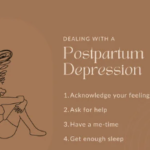When we think about postpartum depression and anxiety, we often imagine the mother at the center of the struggle. The emotional turmoil, the exhaustion, the overwhelming sense of isolation—these are all experiences that we associate with new mothers. However, what many do not realize is that fathers also face these challenges after the birth of a child, yet their struggles often go unnoticed.
In Nigeria, where societal expectations of masculinity run deep, acknowledging that fathers experience mental health issues like depression and anxiety after childbirth is still considered taboo. If you are a father struggling with these emotions, know that you’re not alone, and it’s time to break the silence.
Understanding Postpartum Mental Health in Fathers
Postpartum depression (PPD) and anxiety aren’t just conditions that affect mothers. Studies have shown that up to 10% of fathers experience postpartum depression, while many more struggle with anxiety, stress, and fatigue in the months following the birth of their child.
In Nigeria, where men are often expected to be the emotional pillars of their families, there is little room for vulnerability. As a result, many fathers silently endure these emotional challenges, fearing judgment or ridicule if they admit to feeling overwhelmed or depressed.
If you’ve felt disconnected from your child, anxious about your ability to provide, or overwhelmed by the pressures of new parenthood, you might be dealing with paternal postpartum depression.
According to a publication at Cleveland Clinic, “Men who have a history of depression might be at greater risk of postpartum depression. So are new fathers whose partners also have postpartum symptoms. Unfortunately, many men laugh off the idea of paternal postpartum depression.”
Common symptoms include irritability, fatigue, difficulty bonding with the baby, and a general sense of emotional numbness. These feelings can lead to a sense of inadequacy, especially when your partner is focused on the child, and you feel like your role has become secondary.
While you may not be experiencing the same symptoms as mothers, the mental health challenges you face after the birth of your child are very real and deserve attention.
Cultural and Societal Expectations in Nigeria
In Nigeria, like many parts of Africa, the cultural norms surrounding fatherhood are deeply rooted in traditional gender roles. Men are expected to be the primary breadwinners, the source of strength, and the providers for their families. There is little space for emotional vulnerability.
Society expects fathers to be “strong” and “stoic” during difficult times, including the birth of a child. For many, this means that admitting to feelings of sadness, anxiety, or depression after becoming a parent is seen as a weakness.
This cultural pressure can make it even harder for fathers to seek help when they are struggling. If you are feeling emotionally drained or uncertain about your role as a father, you may fear that asking for support would make you appear weak or inadequate.
But the truth is, seeking help is a sign of strength, not weakness. It is essential to remember that your mental health matters just as much as your physical health and that caring for your emotional well-being is an important part of being a good father.
The Impact of Ignoring Paternal Mental Health
Ignoring mental health struggles can have lasting consequences, not just for you, but also for your child and your family. When a father suffers from postpartum depression or anxiety and does not seek help, it can negatively affect the father-child relationship.
Research has shown that a father’s emotional state plays a crucial role in the development of his child. Fathers who struggle with mental health issues may have difficulty forming a strong bond with their child, which can impact the child’s emotional and social development.
Moreover, the emotional strain on a father can also affect the family dynamic. If you are unable to share your feelings or seek help, the emotional burden may fall on your partner, leading to added stress, marital tension, and a sense of isolation.
It’s essential to understand that by taking care of your mental health, you not only improve your own well-being but also contribute to a healthier, more balanced family environment.
Efforts to Address Paternal Postpartum Mental Health
In recent years, there has been a growing recognition of the importance of paternal mental health, both globally and in Nigeria. However, much work remains to be done.
In a June 2022 BBC article by Ruggeri(2022) titled “Male Postnatal Depression: Why Men Struggle in Silence”, the story of David Levine was shared, revealing how his anger and frustration had been escalating since the birth of his son.
Like many newborns, the baby struggled to adjust to life outside the womb. But for Levine, it felt as though his son was constantly crying. “I took it personally, like I’m failing, like I’m not doing my job,” he explains. “I also started feeling like it was directed at me—that my son was crying because he didn’t like me.”
Many healthcare providers are still focused on the mother’s well-being, and fathers’ mental health issues are often overlooked during routine checkups. Yet, some healthcare professionals in Nigeria are beginning to take paternal mental health more seriously by providing screenings and referrals for fathers struggling with depression and anxiety after childbirth.
Some hospitals are now offering specialized programs for fathers to support them during the postpartum period.
Organizations such as the Nigerian Mental Health Foundation (NMHF) and other local initiatives are also playing an active role in raising awareness about paternal mental health.
However, there remains a significant gap in both public awareness and access to resources. Fathers in Nigeria often struggle to find support networks that cater to their unique needs, and this lack of resources can prevent them from seeking the help they desperately need.
Practical Solutions for Fathers
If you are experiencing postpartum depression or anxiety, it’s important to remember that there are steps you can take to improve your mental health. The first and most important step is acknowledging that it’s okay to feel the way you do.
Seeking help is not a sign of weakness, but rather an important step in caring for yourself and your family.
- Seek Professional Help: It’s crucial to talk to a healthcare professional about your feelings. While many people still feel uncomfortable seeking therapy, there are now more online counseling services in Nigeria, such as MyMind Therapy and The Nigerian Psychological Association, that provide accessible mental health services.
- Talk to Your Partner: Communication is key to understanding each other’s emotional needs. If you are feeling overwhelmed, talk to your partner about what you’re going through. It’s important to share your struggles so that you both can work together to support one another.
- Engage in Self-Care: Taking care of your mental health also means taking care of your body. Simple practices like exercise, proper sleep, and healthy eating can go a long way in alleviating symptoms of anxiety and depression.
- Bond with Your Child: Spending quality time with your newborn can help build a stronger emotional connection. Try to engage in activities that allow you to bond with your child, whether it’s feeding, changing diapers, or simply holding them. This connection can improve your emotional well-being and help you feel more involved in your child’s life.
Changing the Narrative: The Role of Society
Breaking the stigma surrounding paternal mental health requires a collective effort. Nigerian society needs to redefine what it means to be a strong and supportive father. Strength should not be defined solely by financial provision or physical resilience, but also by emotional openness and the willingness to seek help when needed.
By challenging these traditional gender roles, we can create a culture where fathers feel empowered to seek support without fear of judgment. The media, local leaders, and mental health professionals all have a role to play in advocating for better awareness of paternal mental health.
Public health campaigns, educational programs, and local initiatives can help fathers understand that it’s okay to be vulnerable and seek help when necessary.
Conclusion
If you are a father struggling with postpartum depression or anxiety, it’s time to break the silence. Your mental health is just as important as your child’s, and taking care of yourself is crucial to being the best father you can be.
Seek support, communicate openly, and remember that you are not alone on this journey. The more we normalize conversations about paternal mental health, the more fathers will feel empowered to seek the help they need—and together, we can break the stigma that continues to shroud this important issue.
REFERENCES.
Cleveland Clinic.(2019). Yes, postpartum depression in men is very real . Accessible from : https://health.clevelandclinic.org/yes-postpartum-depression-in-men-is-very-real.
Rugerri, A. (2022). Male postnatal depression: Why men struggle in silence. Acessible from : https://www.bbc.com/worklife/article/20220601-male-postnatal-depression-why-men-struggle-in-silence.



















